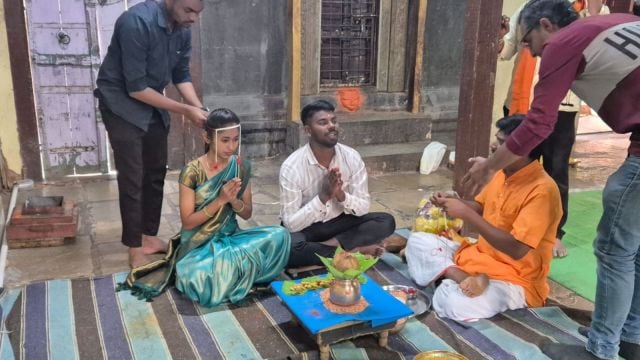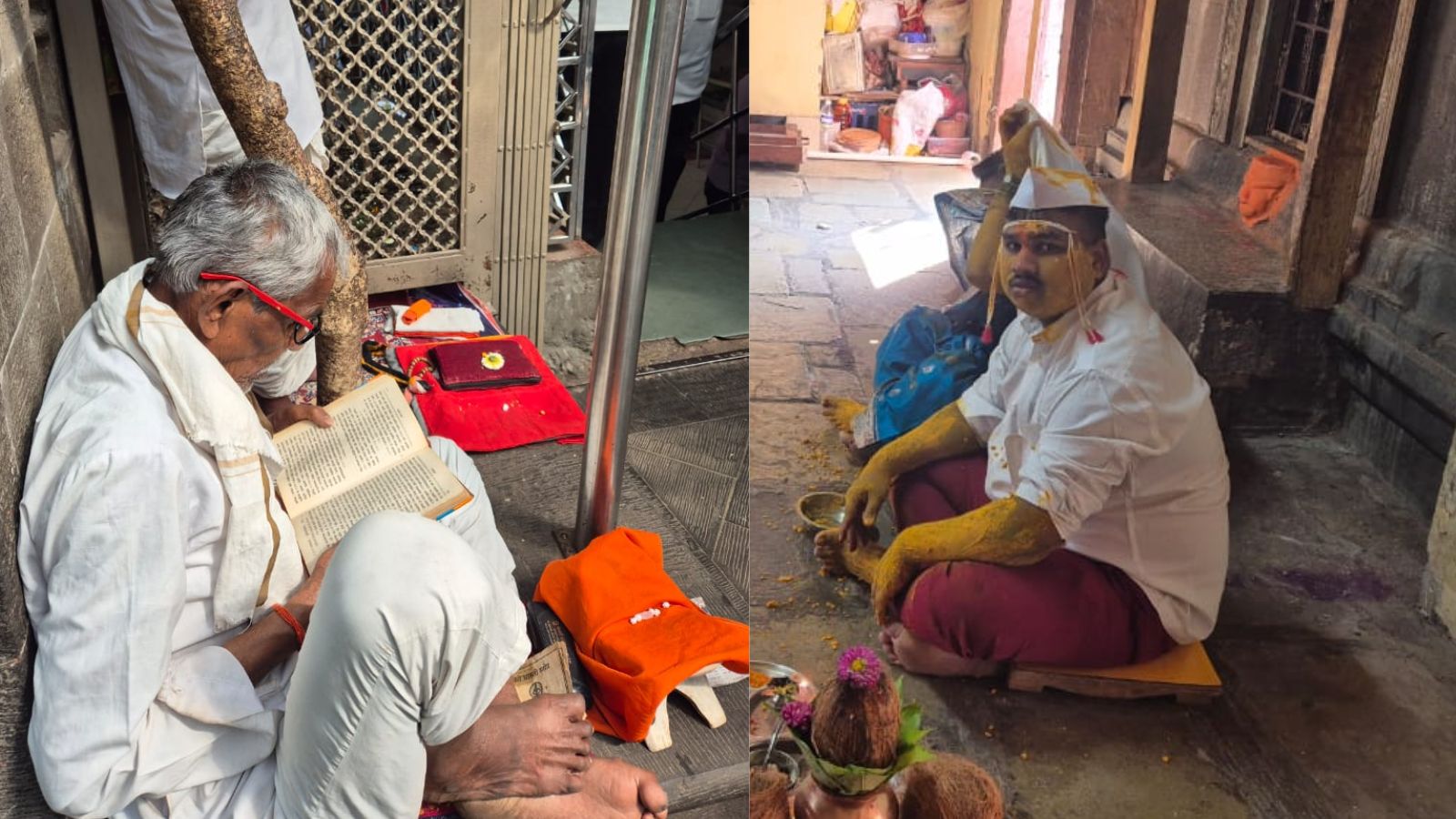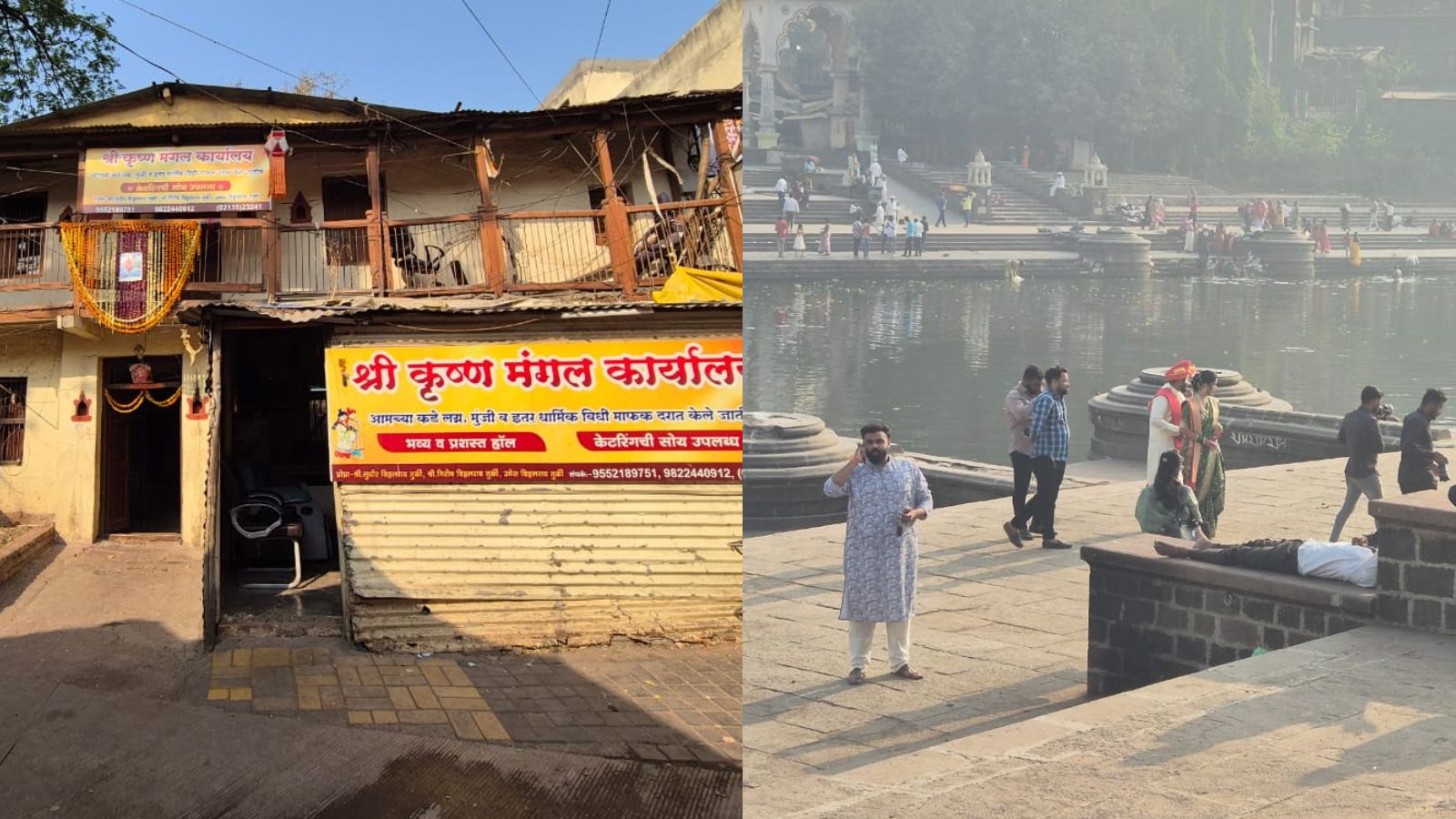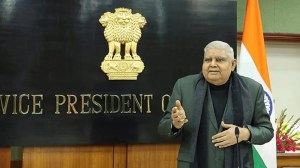Click here to join Express Pune WhatsApp channel and get a curated list of our stories
From traditional weddings to live-in bonds: How Alandi is embracing change
Called the marriage capital of Maharashtra, Alandi witnesses over 18,000 weddings every year.
 "The wedlocks happen irrespective of the wedding season, which is why it is called the marriage capital of Maharashtra,” said Janak Joshi, president of the Alandi Mangal Karyalaya Association. (Express photo)
"The wedlocks happen irrespective of the wedding season, which is why it is called the marriage capital of Maharashtra,” said Janak Joshi, president of the Alandi Mangal Karyalaya Association. (Express photo)The temple town of Alandi is witnessing a remarkable transformation. This pilgrimage town, particularly attractive for inter-caste couples and eloping partners, is embracing contemporary relationship dynamics, including live-in bonds and senior citizen unions. Situated along the Indrayani River, around 22 kilometres from Pune city, Alandi has evolved beyond its identity as a revered pilgrimage site.
“Alandi has over 100 marriage halls, some of which are as small as 10 square metres in area. On average, over 18,000 weddings take place in Alandi consistently every year. Most of them in April-May and November-December. The wedlocks happen irrespective of the wedding season, which is why it is called the marriage capital of Maharashtra,” said Janak Joshi, president of the Alandi Mangal Karyalaya Association.
“Couples usually book their slots a day before their big day and are required to be present with at least three witnesses and age-related documents. After verifying the documents, we perform the rituals and provide them with a certificate that indicates the union was performed as per essential rituals, it’s called a registered marriage. Then, the document needs to be submitted to the couple’s nearby government registrar to obtain a marriage certificate,” said Girish Turke, fourth-generation owner of the Shri Krishna Karyalaya.
 While Alandi has gained recognition for facilitating non-traditional unions, it remains equally popular for conventional marriages. (Express photos)
While Alandi has gained recognition for facilitating non-traditional unions, it remains equally popular for conventional marriages. (Express photos)
“While marriages start at Rs 5,000, we now have couples spending upwards of Rs 25 lakh in banquet halls. Also, in most cases, for the destitute and persons with disabilities, organisers perform their marriages free of cost. So, Alandi is no more restricted to only economic marriages,” added Turke.
Evolving trend
“We used to arrange the marriage ceremony in temple premises, but due to the rising number of couples opting to marry within the temple, the administration decided to discontinue the elaborate rituals and prioritise the holy place for pilgrims. Now couples are only allowed for ‘abhishek seva’ within the ‘garbhagriha’ in the morning hours. While the marriage rituals, including procession, need to be carried outside the temple premises in marriage halls and dharmashalas,” explained Amol Gandhi, Alandi temple priest.
“Alandi is famous for eloped and inter-caste marriages, most of which are young couples. Earlier mass marriages were frequent, but they have been reduced to almost one event a year. In the last few years, we have been visited by people of all ages, even senior couples over 60 years of age who are getting married, who usually face opposition from their family and community. While Interfaith marriages are done in the presence of the marriage registrar, the couple needs to either book their visit in marriage halls or arrange their union in the registrar’s office as per the Special Marriage Act of 1954,” added Turke.
“There is a rising trend where young couples or in some cases where the girl is above 18 years of age but the boy is between 18 and 21 are opting for live-in relationships through live-in bonds. For this, they must register their consent on a stamp paper with essential details that give legal backing and consent to stay together. I register around 50 such bonds a month. The rise is because people find Alandi safe for registering marriages; in courts, couples say secrecy is a risk, especially for eloped and inter-caste unions,” said Priyesh Sonawane, an Alandi-based advocate.
“Additionally, there are cases of separated couples, living apart for a long time but not formally divorced but who may have found new partners – they are also opting for Live-in bonds through stamp paper. This includes signing a joint affidavit and a video statement, mentioning their age, religion, how long they have known each other, their marital status, the number of children from it, and other information declaring their consent to stay together. These are sought to avoid false allegations like sexual offences and others in the future,” added Sonawane.
While Alandi has gained recognition for facilitating non-traditional unions, it remains equally popular for conventional marriages. “I had an arranged marriage near the temple complex, which our families attended. People are drawn to Alandi because of its religious significance and the availability of various wedding venues and customisable packages to suit specific event needs and budgets,” said Nilesh Langhi, a resident of Mumbai.
 “The Covid lockdown’s impact on marriages and footfall highlighted how dependent Alandi’s economy has become on the wedding business,” said Harshad Bansode, a resident of Alandi.
“The Covid lockdown’s impact on marriages and footfall highlighted how dependent Alandi’s economy has become on the wedding business,” said Harshad Bansode, a resident of Alandi.
The transformation has also reshaped Alandi’s economic fabric. “Earlier, agriculture was the main source of income, but due to enhanced connectivity to Pune and Pimpri-Chinchwad and rising footfall, the town’s economy has witnessed a shift. Many have started opting for businesses like food catering services, matrimonial agencies, hotels, lodges, floristry, banquet halls, etc. Slowly, the economy is becoming dependent on the marriages that are performed in Alandi. The Covid lockdown’s impact on marriages and footfall highlighted how dependent Alandi’s economy has become on the wedding business,” said Harshad Bansode, a resident of Alandi.
Rising challenges
“In response to the rising traffic jams, road blockades, and noise pollution, Alandi police station has banned elaborate and noisy marriage processions with steps like banning DJ equipment. Additionally, Dharamshalas, whose mandate is to cater for pilgrims and organise events to recite Dnyaneshwar Maharaj’s haripath and kirtan, have been given an 11-month agreement for marriage ceremonies. They have become commercial hubs. As a result, devotees visiting from across the country find it difficult to find accommodation facilities and are forced to pay for costly stays. Hence, we have asked the Dharmashalas to be closed for marriages during Ashadi and Kartiki Ekadashi when Alandi attracts high footfall of devotees. And we demand that the marriage halls must manage their parking space to avoid traffic chaos,” said Dnyanesh Veer, president of the Dnyaneshwar Maharaj Sansthan Committee.
“In addition, young couples forge age-related documents such as the matriculation certificate for registered marriages. With no QR code on it, it becomes difficult to verify them and are facing legal issues amounting to underage marriages,” added Sonawane.
“With several senior couples getting married, verifying their marital status becomes tricky. So we ask for their affidavit to comply with the monogamy rules under Section 5 (1) of the Hindu Marriage Act, 1955,” Turke said.
Despite these challenges, Alandi continues to adapt, balancing its sacred heritage with evolving social needs.
Click here to join Express Pune WhatsApp channel and get a curated list of our stories












